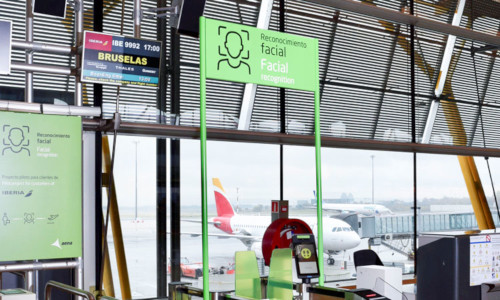Aena tests facial recognition system for boarding at Adolfo Suárez Madrid-Barajas Airport

The chairmen of Aena, Maurici Lucena, and Iberia, Luis Gallego, accompanied by representatives from partner tech firms have presented the new facial recognition system for boarding at Adolfo Suárez Madrid-Barajas Airport.
This year Aena has kicked off a second facial recognition test project at an airport, in this case Adolfo Suárez Madrid-Barajas, in its quest to develop airports in the society of the future as a framework for building new technologies and innovative trends into the airport setting.
On the strength of the positive outcomes achieved and the satisfaction of passengers who have used this system in the pilot project implemented in March at Menorca Airport, a further option has been added to the process at AS Madrid-Barajas. It consists of the chance of registering from a mobile device on the apps run by Aena and Iberia, the airline which the company is working with this time round.
Based on identification technology that recognises people’s physical and non-transferable features, the biometric system equipment is located next to the check-in desk, at the entry to the security filter and at the boarding gate where the passengers’ biometric data, their facial features and identity documentation such as ID card or passport will be verified. This is designed to enable travellers to board the plane without showing their boarding pass or identity documentation, thus speeding up the process and increasing security. The documentation is validated with biometric data only once during the pilot scheme as long as the passenger gives their consent for subsequent flights.
The tests are being carried out with Iberia customers flying to Asturias and Brussels who can voluntarily take part in the project and travel more smoothly, efficiently and easily.
Aena and Iberia have worked on this project in partnership with IECISA, Gunnebo and Thales, the firms tasked with developing, supplying and installing the equipment needed to perform the test. In this case it consists of automated systems which include advanced document validation and biometric technologies to optimise performance in passenger boarding time.
This major breakthrough places Aena at the forefront of the industry worldwide by integrating in a single process all the steps to be taken at an airport in the security filter and boarding while also allowing registration of documentation from the Iberia and Aena apps at any time prior to travel.
This project is part of Aena’s “Airport 4.0” strategy which promotes testing, validation and implementation of ground-breaking solutions that enable the provision of innovative and sustainable airport services with the highest standards of security, safety, quality, efficiency and care for the environment.


